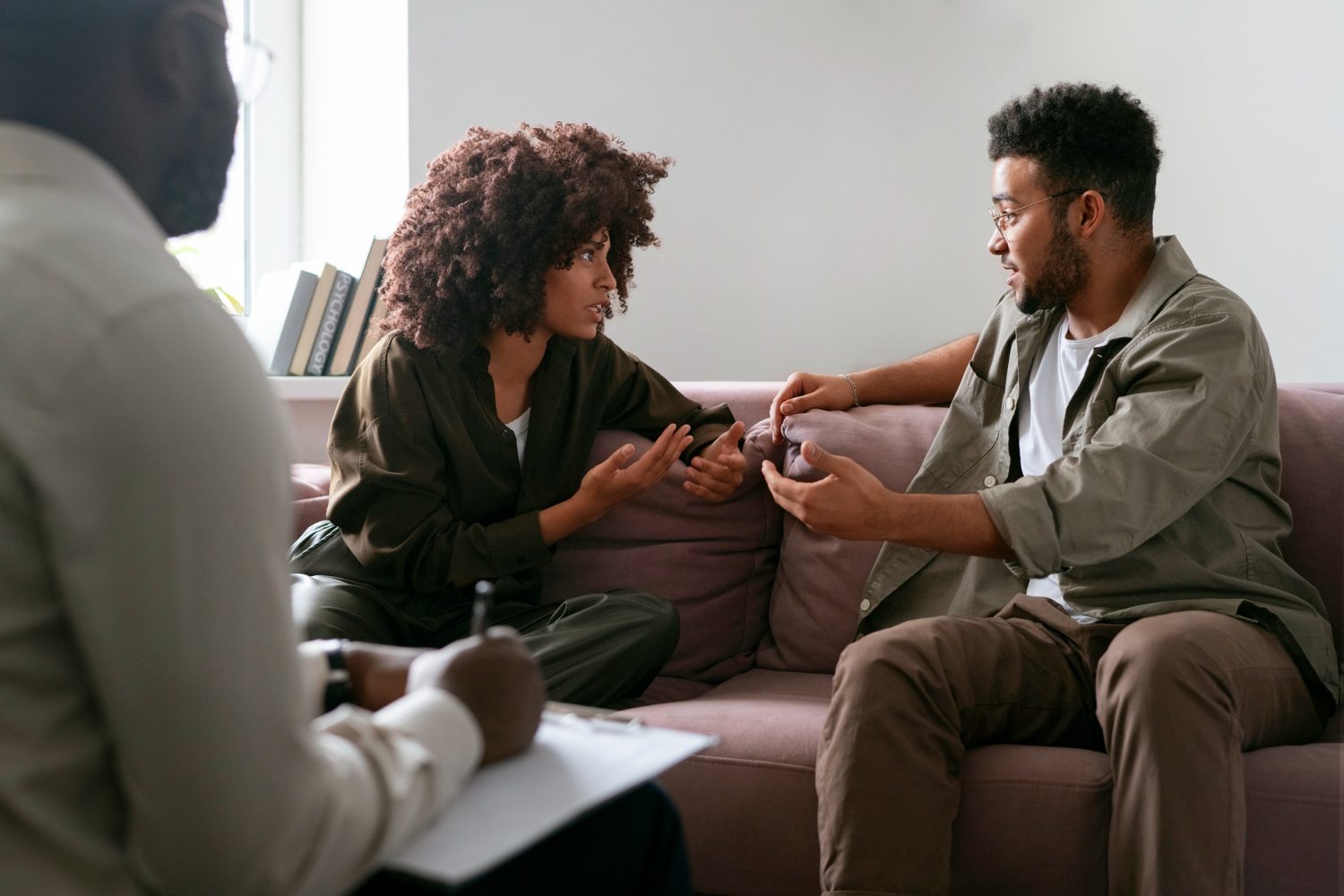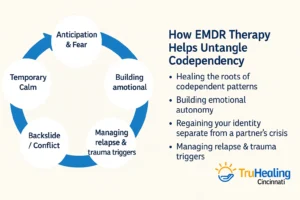Loving someone in addiction often feels like trying to swim while hauling bricks.
You move. Barely. Bruised. Exhausted. But you keep going—because you believe you must. Because love, to you, means staying when it hurts.
You’re not wrong. You’re not broken for caring this much. But you are worn. And there is a way to heal—not by giving up your heart, but by reclaiming your boundaries, your voice, your self. That’s where EMDR therapy can help. (At TruHealing Cincinnati, we’ve seen partners find relief, clarity, and hope through this work.)
This isn’t about abandoning love. It’s about finally learning to love without losing yourself.
What Does the Cycle of Codependency Look Like?
Codependency is more than “helping too much.” It’s a repeating emotional spiral where your sense of safety, purpose, and self-worth come to depend on another person’s mood, usage, or stability.
Here’s how the cycle often plays out:
- Anticipation & Fear — You wake up anxious. Did they use? Where are they?
- Rescue & Fix — You call, text, intervene, excuse, protect.
- Temporary Calm — They sigh, promise, stabilize—just awhile.
- Backslide / Conflict — Old patterns reemerge, tension builds, crisis returns.
- Guilt & Self-blame — You ask, “What did I do wrong?” / “Why can’t I fix this?”
The cycle repeats. Over years. Sometimes over decades. Love becomes tangled with survival instinct. You believe your value lies in how well you manage chaos. You carry the emotional ballast so they don’t drown—and in doing so, you start to sink.
That’s not weakness. It’s adaptation. But it’s also unsustainable.
Why Boundaries Feel Impossible
You may have tried to set boundaries before. “Don’t call me when you’re high.” “Don’t use in our home.” “Get help or leave.” And then you feel guilty, or fearful, or the boundaries crumble.
Boundaries feel impossible when:
- You’re convinced your love is conditional—meaning your partner leaving or using feels like abandonment.
- You’ve internalized early messages: “If you don’t care, who will?”, “I have to work harder to be loved.”
- You equate withdrawal of your love with emotional death—for them or for you.
In that context, boundaries feel cruel. But boundaries are not walls—boundaries are protection. They’re a way to show love without losing you.
EMDR therapy can help you rewire how boundaries feel. Instead of terror or shame, they can feel like clarity, respect, safety.
How EMDR Therapy Helps Untangle Codependency
EMDR (Eye Movement Desensitization and Reprocessing) isn’t just trauma therapy. It’s a tool for emotional regulation, clarity, and rewiring old survival responses.
1. Healing the Roots
Before codependency, there’s often pain: childhood neglect, emotional enmeshment, roles that forced you to parent others. EMDR helps you gently revisit those core moments—not to relive, but to reprocess.
You start to see: I wasn’t always the “fixer.” I didn’t always have to survive by extinguishing other people’s flames.
2. Building Emotional Autonomy
Through EMDR, emotional responses detach from automatic reactions. You practice:
- Feeling guilt without collapsing
- Saying “no” without terror
- Not jumping when a message doesn’t come
- Letting someone feel consequences while you stay firm
Over time, your emotional system recalibrates. The need to rescue lessens. The compulsion to react decreases.
3. Regaining Your Identity
When your life orients around another’s crisis, you lose your own compass. EMDR helps you reconnect to your own emotions, values, and dreams—without shame or apology.
You gradually shift from “I must hold on” to “I deserve to be held on to, too.”
4. Managing Relapse & Trauma Triggers
In a relationship with addiction, relapse and crisis are part of the landscape. EMDR equips you to process those events without crumbling.
You don’t deny the pain. You don’t ignore the trauma. You learn to feel it enough to heal it, so your decisions don’t come from desperation.
What the EMDR Journey Feels Like (From Real Clients)
- “I wept over things I forgot were still alive in me.”
- “I could feel my body relax when they talked about setting rules.”
- “I used to wake up thinking, ‘What did I do last night?’ Now I wake up asking, ‘How do I feel?’”
- “In one session, I realized how much blame I carried that didn’t belong to me.”
It’s not magical. It’s slow, sometimes ugly. You’ll resist it. You’ll sit with fear. But within that discomfort, small fissures open, and they let in light.
How to Know EMDR Might Be Right for You
You might benefit from EMDR therapy if:
- You endlessly replay “what ifs” about their use
- You gaslight yourself (“I’m overreacting”) or minimize pain
- You feel hollow when they’re gone, frantic when they’re present
- You’re stuck in cycles even when you try to change
- You’re exhausted, anxious, dissociated
EMDR is not for crisis stabilization—that’s often handled first by therapy, psychiatry, or medical care. But once safety is present, EMDR is a powerful tool for deeper healing. Whether you’re near Lawrenceburg, Lexington, Springfield, or Louisville, you’ll find TruHealing programs built on that same caring approach.
Frequently Asked Questions (FAQs)
Q: Will EMDR force me to talk about everything?
A: No. EMDR is not narrative-based. You don’t have to lay out your life story. It works with the emotional and somatic residue of memories—not always the full memory itself.
Q: How many EMDR sessions will I need?
A: It varies. Some people see shifts after 4–8 sessions. Others may go deeper over months. It’s about depth, not speed.
Q: Can I do EMDR if my partner is still using?
A: Yes. In fact, many partners engage in EMDR while their loved ones are still active. You don’t need to wait for their recovery to begin yours.
Q: Will EMDR tell me whether to leave or stay?
A: No. EMDR therapy helps you hear your own truth. It supports clarity—not dictating choices.
Q: Is EMDR available at TruHealing Cincinnati?
A: Yes. TruHealing Cincinnati offers EMDR therapy as part of our trauma-informed addiction therapy services for individuals and partners alike.
Next Steps to Start EMDR Healing
- Reach out for a consultation — Ask about codependency and couple support.
- Screen with a trauma-informed clinician — Ensure safety, pacing, and capacity to regulate.
- Set intentions together — Not “fix him/her,” but “heal me.”
- Work in episodes — EMDR sessions spaced out with stabilization work in between.
- Track your shifts — Boundaries get easier. Emotional reactivity softens. Your inner life returns.
You don’t have to wait for them to change before you heal. You don’t have to rescue yourself either—there is a different, gentler path.
You can still love. But you don’t have to disappear into their crisis.
EMDR therapy doesn’t repair everything overnight. But it gives you back your emotional footing—and lets you make decisions from clarity, not chaos.
Call (888) 643-9118 or visit our EMDR Therapy page in Cincinnati, Ohio to learn how we can walk with you as you break codependency and reclaim your self.


